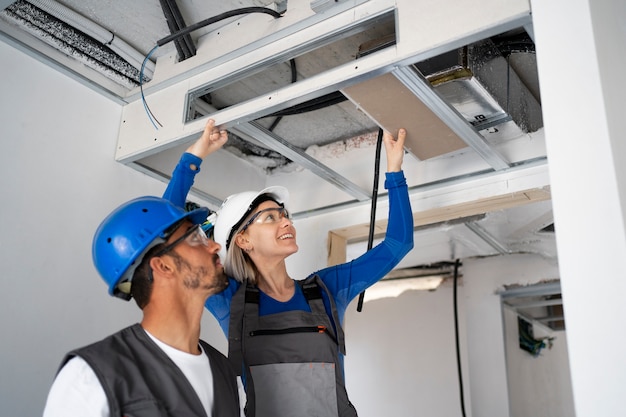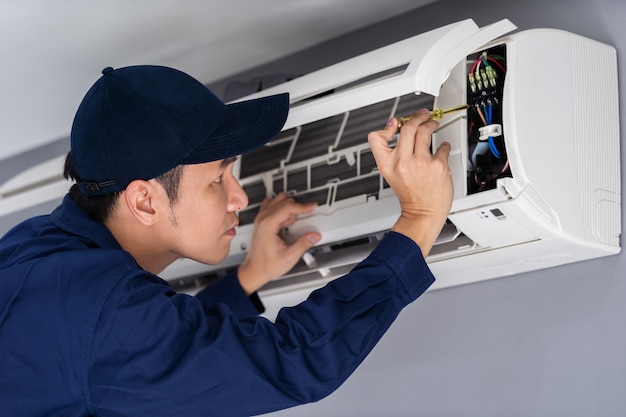Life in the scorching heat of summer months without air conditioning is unimaginable! But what if one beautiful sunny day you're depending on that AC to keep you cool and comfortable, and it just fails? Imagine the stress and discomfort of a hot, stuffy room. This is why we're sliding in today with an unmissable guide to air conditioning maintenance. Have you ever questioned; how often should you repair your AC? Or what is the role of regular air conditioning repair? If these are queries that have crossed your mind, then you've arrived in an oasis of answers.
In the spirit of understanding the benefits of an efficient cooling system, this post explores the importance of regular air conditioning repair and servicing. We'll delve into the various aspects like when and why the AC needs repairing, what steps to follow, and most importantly, how to mitigate the risk of a breakdown. This guide will equip you with useful tips for taking care of your precious air conditioning system, thus ensuring a comfortable living environment.
 |
| Air Conditioning Repair |
Why Invest in Regular Air Conditioning Repair
Air conditioning systems aren't just about experiencing a cool breeze on a hot summer's day; they ensure quality air and optimum home temperature for comfortable living. This section will underline the importance of regular air conditioning repair in maintaining an effective and efficient system. Regular maintenance not only extends the life of your AC but also saves on repair costs.
Investing in regular air conditioning repair is essential for several reasons. Firstly, routine maintenance and repairs ensure that your AC unit operates efficiently, reducing energy consumption and lowering utility bills. A well-maintained AC system also provides better indoor air quality, promoting a healthier living or working environment by filtering out pollutants and allergens.
Secondly, timely repairs prevent minor issues from escalating into major, costly problems. Regular maintenance helps identify and fix small glitches before they cause significant damage, extending the lifespan of your air conditioner and saving you from expensive replacements.
Moreover, a properly functioning AC system enhances overall comfort. Regular repairs and maintenance ensure consistent cooling or heating throughout your space, making your home or office a more pleasant place to be, regardless of the weather outside.
Lastly, investing in regular air conditioning repair contributes to environmental conservation. A well-maintained AC unit operates efficiently, reducing its carbon footprint and promoting energy conservation.
When to Opt for Air Conditioning Repair
Sometimes, we don't realize our air conditioning needs some TLC until it's too late. This section will navigate you through the signs indicating that your air conditioning needs repair. Recognizing them early can make a significant difference in the longevity and effectiveness of your system.
When your air conditioning system starts malfunctioning, it's essential to recognize the signs that indicate the need for repair. Some common indicators include insufficient cooling, strange noises, unpleasant Odors, and high energy bills. If you notice any of these issues, it's advisable to opt for air conditioning repair promptly. Delaying repairs can worsen the problem, leading to costly replacements or extensive damage to your AC unit. Regular maintenance can also help prevent major breakdowns, ensuring your system operates efficiently and effectively. Ultimately, addressing AC issues promptly through professional repair services can save you money, enhance your comfort, and prolong the lifespan of your cooling system.
Who to Call for Air Conditioning Repair
Surely, we can't ignore the importance of relying on skilled experts for air conditioning repair. This section will guide you on the qualities to look out for when choosing your service professionals. Hiring an experienced specialist ensures that your AC won't give up, in the heat of the moment.
How to Prevent Air Conditioning Breakdowns
Here, we will present some quick and easy steps to prevent a daunting system breakdown. Practicing proactive maintenance techniques can globally improve your air conditioner's performance.
Pros and Cons of Regular Air Conditioning Repair
The benefits of regular maintenance are seemingly endless, like energy efficiency, cost savings, and improved air quality. However, acknowledging the potential challenges you might face during regular AC repairs is equally important.
Impact of Neglected Air Conditioning Repair
Ignoring a small problem today can lead to a major issue tomorrow. This section will elaborate on the adverse effects of neglected AC repair and how they can be averted.
Neglected air conditioning repair can have several significant impacts on both your comfort and your wallet. Here are some key points to consider:
Decreased Efficiency: A neglected AC system will lose its efficiency over time. Dust accumulation, worn-out parts, or low refrigerant levels can force the system to work harder to cool your home, leading to increased energy consumption.
Higher Energy Bills: As your AC unit struggles to operate efficiently, it will consume more electricity, causing a spike in your energy bills. Regular maintenance and timely repairs can ensure your system operates at peak efficiency, saving you money in the long run.
Reduced Comfort: An AC system in need of repair might not be able to maintain the desired temperature and humidity levels in your home. This can lead to discomfort, especially during extreme weather conditions, impacting your overall well-being and productivity.
Shortened Lifespan: Neglecting repairs can significantly reduce the lifespan of your air conditioning unit. Regular maintenance and timely repairs can prolong the life of your system, saving you from the costly expense of premature replacement.
Potential Health Issues: A malfunctioning AC system can lead to poor indoor air quality. Dust, mold, and other allergens can accumulate in the system, circulating harmful particles throughout your home. This can trigger allergies and respiratory problems, particularly in individuals with sensitivities.
Risk of Costly Breakdowns: Ignoring minor issues can escalate into major problems, leading to sudden breakdowns. Emergency repairs or replacements can be much more expensive and inconvenient compared to addressing issues as they arise.
 |
| Air Conditioning Repair |
Conclusion
Disregarding regular maintenance of your air conditioning can result in uncomfortable situations, higher energy bills, and unexpected breakdowns. Regular service and efficient repair strategies are undoubtedly the keys to an extended lifespan of your air conditioning system, assuring a pleasant and comfortable lifestyle.
Annual inspections by skilled professionals are essential to detect potential issues early, preventing significant problems and costly repairs in the future. Balancing the pros and cons, the bottom line leans heavy towards maintaining regular air conditioning repair for optimized operation and superior comfort.
By educating yourself and acting proactively, you will minimize the chance of facing a complete breakdown in the peak of summer. Follow this guide, stay cool, and enjoy the benefits of a well-tuned air conditioning system!


